Book contents
- Frontmatter
- Contents
- List of illustrations
- List of maps
- List of tables
- Acknowledgments
- Introduction
- 1 The decline of empire, the dream of a republic: 1890s–1911
- 2 The early Republic – chaos and creativity: 1912–28
- 3 The Nanjing decade – a new beginning? 1928–37
- 4 The Resistance War – warfare and chaos: 1937–45
- 5 The Civil War – the most vicious conflict: 1946–9
- 6 More than survival – the Republic on Taiwan: 1949 to the present
- Conclusion: the end of the Republic?
- Index of names
- Index of places
- Index of subjects
- References
Conclusion: the end of the Republic?
Published online by Cambridge University Press: 05 June 2012
- Frontmatter
- Contents
- List of illustrations
- List of maps
- List of tables
- Acknowledgments
- Introduction
- 1 The decline of empire, the dream of a republic: 1890s–1911
- 2 The early Republic – chaos and creativity: 1912–28
- 3 The Nanjing decade – a new beginning? 1928–37
- 4 The Resistance War – warfare and chaos: 1937–45
- 5 The Civil War – the most vicious conflict: 1946–9
- 6 More than survival – the Republic on Taiwan: 1949 to the present
- Conclusion: the end of the Republic?
- Index of names
- Index of places
- Index of subjects
- References
Summary
The Republic of China is now in its ninety-fifth year. The scope of its rule is limited to the island of Taiwan, it has few international friends, and a major enemy less than 100 miles away often threatens it. The Republic has internal enemies, some of them at the highest level of government, who would like to see it disappear. And yet it survives, as it has for the last nine decades, against the odds.
Disjunctions and continuities
Political transitions
At its foundation, the Republic of China was heir to one of the longest-surviving political entities in the world. The efforts to introduce a new regime of modern, civilian government, to replace the imperial system, were preempted by warfare; the first four decades of the Republic were a bitter struggle through military rule and full-scale warfare.
In 1949 the Republic collapsed on the Mainland, but it survived on Taiwan. Within the nearly six decades since the loss of the Mainland the Republic has achieved much of what the GMD set out to do on the Mainland – the establishment of democracy, a strong economy, a free media, and the rule of law. The Republic on Taiwan has shown that it is possible to break the tradition of authoritarianism and to bring about a transition in political power without revolution. It has shown that a government can reform itself, and that political evolution is viable.
- Type
- Chapter
- Information
- China's Republic , pp. 211 - 216Publisher: Cambridge University PressPrint publication year: 2007



